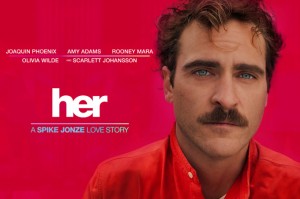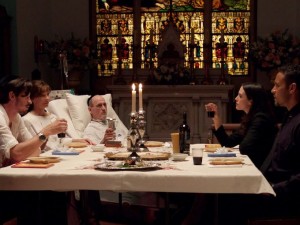
“Transition objects” are usually thought of as the stuffed toys toddlers hold onto so as a way of feeling more secure as they begin to separate from their parents and navigate the bigger world. But we all have them. We all carry real or virtual talismans to keep us from feeling adrift or abandoned.
And we all understand the bliss and torment of the Rorschach test stage of love, as what we project onto the objects of our physical and emotional desire has to give way to the reality of who they are. If we’re lucky, it’s even better than we imagined and they feel that way about us, too.
Director Spike Jonze (“Being John Malcovich,” “Where the Wild Things Are”), working from his own screenplay, combines these two ideas in a wistful love story set slightly in the future simply called, in a reflection of its longing, “Her.” Joaquin Phoenix plays Theodore and his job as a ghost writer of analog letters makes a kind of sense as the logical next step in a world where communication by text and Skype might make the idea of an old-school correspondence more valuable just as the ability to create them is barely vestigial.
Theodore spends his days writing letters of great tenderness and affection but there is none in his own life. Recently divorced from Catherine (Rooney Mara) for reasons we never learn, he is withdrawn, isolated, alone. When he is not working, he stays in his spare, generic apartment and plays a video game. And then a new operating system comes on the market that is so responsive it virtually (in both senses of the word) achieves consciousness. (Apparently, no one there has seen “Terminator,” because this sounds a lot like Skynet to me, but perhaps that is the weaponized version.) Theodore decides to give it a try.
The new operating system calls herself “Samantha” and she has two enormously appealing qualities. First, she has the throaty, intimate voice and delicious laugh of Scarlett Johansson (a performance of magnificent warmth and wit). Second, she is utterly devoted to Theodore and utterly formed by him. It is that most gratifying of relationships because he is everything to her and she is content for him to be so. Plus, she is wonderfully competent, sorting through thousands of emails in a fraction of a second to organize them and, along the way, learn everything about him.
Theodore is not ready for a real relationship with a woman who might want something from him or be different from what he visualizes or idealizes. But Samantha seems perfect, both in her innocence and in her progress. He has the pleasure of explaining the world to her and his spirit opens up as he sees her curiosity, appreciation, and engagement. He is reassured that the people around him (his boss, played by Chris Pratt, his neighbor and college friend, played by Amy Adams) seem to think it is perfectly normal to have a virtual girlfriend. Samantha seems happy about it, too.
But as we have seen in “Lars and the Real Girl,” “Ruby Sparks,” George Bernard Shaw’s “Pygmalion” (which became the musical “My Fair Lady’), there’s no happily ever after in a relationship with a creation. Samantha’s growth trajectory is astronomical. No single human can really have her. And the human qualities she lacks turn out to be important for a relationship, too.
Jonze’s story may be set in the future but it is an ancient one, going back to the original Greek myth about the sculptor who fell in love with the statue he made and whose name became the title of Shaw’s play. It is an eternal story because it is a more extreme version and thus a powerful metaphor about the risks and pleasures of intimacy. Jonze tells that story here with great sensitivity and lyricism, the kind of artistry that machinery can never replace.
Parents should know that this movie includes strong language, sexual references and situations and nudity, and tense and sad experiences.
Family discussion: Would you like to have an e-friend like Samantha? What makes those relationships easier than interacting in real life? What makes them harder?
If you like this, try: “Lars and the Real Girl,” “Ruby Sparks,” “Pygmalion,” “Catfish,” and “You’ve Got Mail”
 Garrett Hedlund stars as Jonathan in this uneven but moving drama about a family facing the loss of a husband and father. The performances are excellent, especially Richard Jenkins as the father and “Downton Abbey’s” Jessica Brown Findlay as Jonathan’s sister.
Garrett Hedlund stars as Jonathan in this uneven but moving drama about a family facing the loss of a husband and father. The performances are excellent, especially Richard Jenkins as the father and “Downton Abbey’s” Jessica Brown Findlay as Jonathan’s sister.
